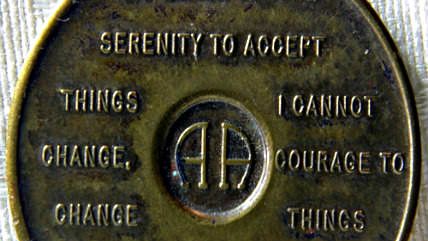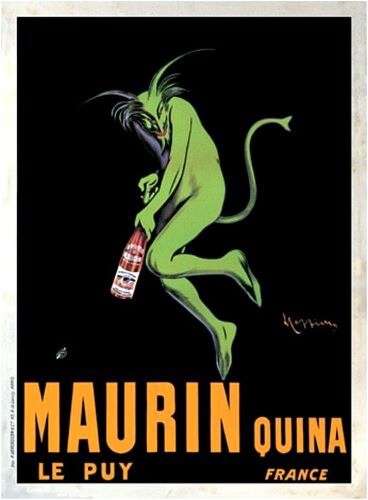The Hijacking of Sobriety by the Recovery Movement
Sobriety isn't an abstinence fixation; it's about having purpose


Recently, The New York Times reviewed a film about octogenarian chanteuse-comedienne Elaine Stritch. The 89-year-old Stritch decided some time ago to give up alcohol, then resumed drinking—but only one drink per day—in her 80s. Here's how the Times described this development: "As a recovering alcoholic, Ms. Stritch, after more than two decades of sobriety, decides to allow herself one drink a day, usually a cosmopolitan. She seems to be abiding by her rule, though it can't be easy."
The Times seems to say Stritch is no longer "sober" since she decided to start having a daily drink, a decision "that she seems to be abiding by." Note the condescension towards Stritch and many others like her. It seems nearly impossible that Stritch could, at her age, hide excessive drinking while being filmed. But the Times questions whether Stritch may be doing so.
This degrading babble traces back to the appropriation of the term sobriety by Alcoholics Anonymous (AA), which has grown into a large and powerful recovery movement that dominates American thinking about addiction. Before AA hijacked the term, "sober" simply meant not being currently intoxicated. Now, sober is a state of being—one you can only achieve through total, lifelong abstinence if you ever drank alcoholically.
According to AA and the recovery movement, no former alcoholic can drink moderately. Any drinking whatsoever, according to these absolutists, and you're no longer "sober." One might think that a person who drinks regularly in a controlled, non-intoxicated manner is obviously not an alcoholic. Wrong!
When I suggested to my AA friend Ken (not his real name) that Stritch shows one-time alcoholics can control their drinking, he objected strenuously. For Ken, "the fact that she has to limit herself to one drink a day proves she's an alcoholic." That's right, drinking in a controlled manner proves you're an uncontrolled drinker.
Many alcoholics can reduce or moderate their drinking
Ken says he's "never known an alcoholic to resume drinking in a controlled manner." Ken mainly knows ex-drinkers, like himself, who are in AA. But this group is a small percentage of recovered alcoholics, the large majority of whom never go to AA or enter rehab.
According to the National Epidemiologic Survey on Alcohol and Related Conditions (NESARC)—a massive government study of 43,000 Americans' lifetime alcohol and drug use—about 75 percent of people who recover from alcohol dependence do so without seeking any kind of help, including specialty rehab programs and Alcoholics Anonymous. And only 13 percent of people with alcohol dependence ever receive specialty alcohol treatment. (Note that 13 percent is the upper figure for 12-step recovery, since ever participating does not mean the person recovered due to AA or rehab.)
The NESARC study also revealed that these recovered alcoholics don't as a rule abstain. "Twenty years after the onset of alcohol dependence, three-fourths of individuals are in full recovery," it notes. "More than half of those who have fully recovered drink at low-risk levels without symptoms of alcohol dependence."
A fixation on abstinence hinders recovery

For recovery absolutists, no one recovers from alcoholism without AA, just as no one can recover without giving up drinking forever. What arrogance! Who gave these self-appointed experts the power to tell everyone how they must achieve recovery?
Just as the recovery movement dictates the language of recovery and sobriety, it also tries to dictate the only true way to achieve recovery. The focus on abstinence is the alpha and omega of the 12 steps. But it requires people in recovery to decide that their lives revolve around an empty space, which is not only undesirable but unsustainable. Abstinence is fine as a recovery plan for either the short or the long term. But you can't commit to nothingness, only to health, goals, and plans.
In my book with Ilse Thompson, Recover! Stop Thinking Like an Addict and Reclaim Your Life with The PERFECT Program, we note that sobriety is best built on having a purpose in life. Recovery means that you embrace a life of engagement and meaning; that you overcome your addiction in the service of your values, plans, and life goals. It doesn't necessarily mean that you never take a sip of alcohol or any consciousness-altering substance again, ever.
We have ample evidence that "addiction is a solvable coping problem rather than a chronic, recurring disease," as a recent Science News article put it. Being positively engaged with life encourages better coping skills and natural recovery. A number of long-term studies support this idea.
The author of one of these studies, Gene Heyman, found that "being married, having a college degree, fearing arrest, facing high drug prices, and developing drug-related health concerns made heavy cocaine, marijuana, and alcohol users more apt to quit or substantially cut back."
Aren't these the obvious reasons that people would quit or cut back on their addictions? Obvious, that is, unless you're convinced of AA's disease model of alcoholism (or its modern neuro-scientific equivalent, the "chronic brain disease" theory of addiction). As long as these perverse ways of viewing addiction hold us captive, we won't recognize the most evident paths to achieving recovery and sobriety. In fact, we won't even understand what these terms mean.


Show Comments (237)